#Graduate filmmaker
Explore tagged Tumblr posts
Photo

Hi! I’m Indigo (or Indy). I’m a freelance filmmaker, specialising in writing and editing and am looking for new projects to work on and filmmakers to collaborate with!
I love to create films that explore grief, found families, LGBTQIA+ relationships and disability.
During my degree in Filmmaking (graduated 2022) I extensively studied Screenwriting and Editing, among other department roles, and I have worked on several short films, from narrative to documentary to commercial. Several of the films I worked on during my time at University have been nominated for or won awards at UK film festivals and competitions.
Since graduating I have been freelancing as an editor, writing personal projects and preparing to study a Masters Degree in Screenwriting this year.
Read more about my work in writing here, editing here and general filmmaking experience here. (All links are desktop only, sorry! Feel free to send me your email in an ask and I’ll send you my CV)
Please reach out if you’re interested in collaborating on upcoming projects!
#Filmmaker#Writer#Editor#Director#DIT#Script editor#Script Supervisor#Graduate filmmaker#Short film#Student film#About me#Indigo Knox Film
0 notes
Text
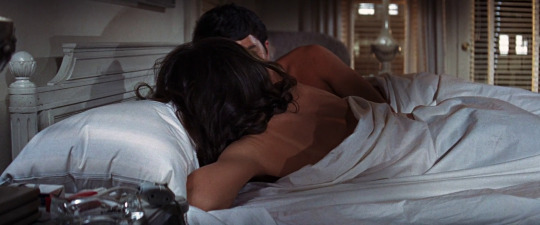
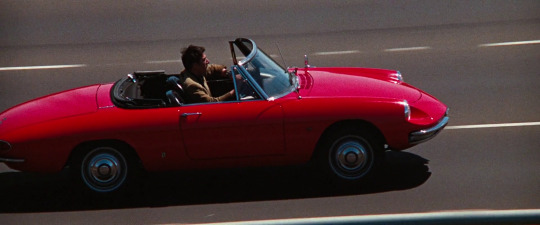
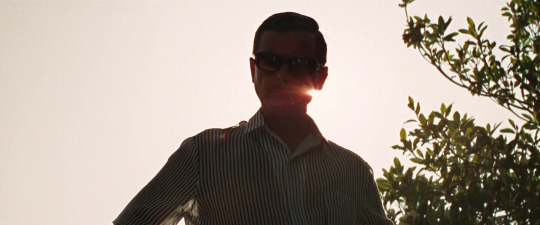

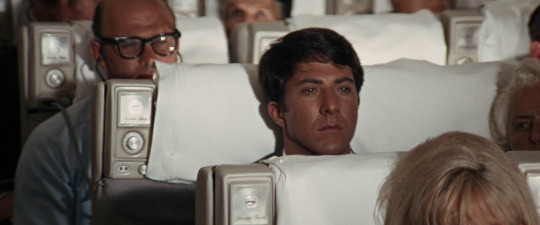

☆ The Graduate (1967) dir. Mike Nichols
#the graduate#mike nichols#anne bancroft#dustin hoffman#film#katharine ross#murray hamilton#cinematography#film screencaps#indie film#director#filmmaking#movies#1967 movies#60s movies
313 notes
·
View notes
Text
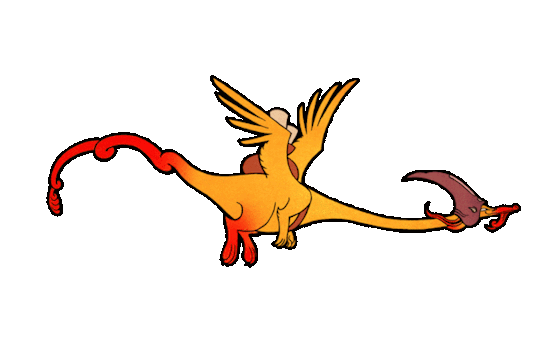
A small flight cycle for our mailman ! (He had a beard when we started designing him, but he lost it in the end because it would have been a nightmare to animate)
If you haven't yet, you can find our graduation movie La Quête de l'Humain (Search of the Human) on Youtube here !!!
#la quête de l'humain#search for the human#gobelins#crfa#crfa22#graduation film#animation film#animated gif#drawing#dragon#mailman#flight cycle#animation cycle#animation#filmmaking#art#2d animation#animated#cartoon
40 notes
·
View notes
Text
The whole Watcher situation is showing how many people know nothing about how a business work
#i don't support a paywall#but like#g u y s#the people who say they should cut down the budget or not hire employees know NOTHING about how a production works#i majored in filmmaking and been working for three years (since I graduated) and minimizing the people working is literally the shittiest–#–decision to ever exist#watcher
10 notes
·
View notes
Text
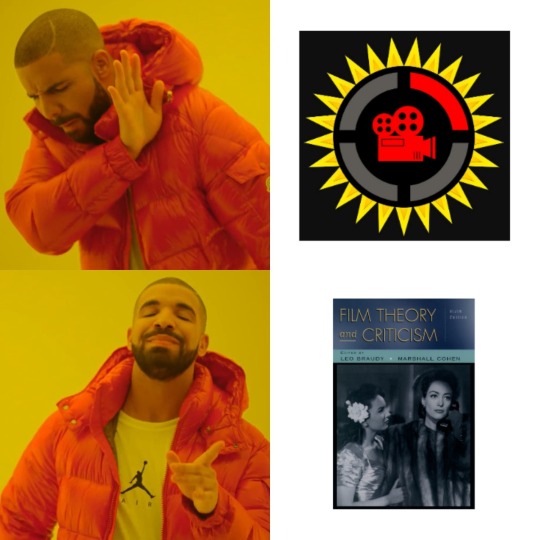
MatPat makes it impossible to talk about my job
#'oh wow you do film theory? so you do matpat stuff?'#no!#i do bazin!#i do eisenstein!!#i do dyer and mulvey!!!#i swear if i had a nickel for everytime i got asked that question i could sue him for defamation#ugh#anyway#film theory#criticism#cinema#cinephile#film#film school#filmmaking#movie#movies#grad school#post graduate#writing#corner conversations
12 notes
·
View notes
Text
My video production professor has once again given me feedback that is so nice and so what I needed to hear that I am crying a little bit
#ej.txt#he told me my recent project was at the same level as the pro 4 students (I’m only in pro 2 cause it’s my minor)#and he said he is willing to give me more challenging assignments if I want to try to progress as much as possible before I graduate#and also he told me to stop calling myself pretentious and to take myself seriously as a filmmaker#in other words he’s so cool and nice and I love him. emotional support millennial.
4 notes
·
View notes
Text

До речі
З днем народження мене 12 днів тому
05.06 був мій найяскравіший в житті знімальний день і мій 16 день народження. Також це був останній знімальний день в ролі студентки 2 підліткового курсу фільммейкінг української кіношколи. Я закінчую цей заклад вдруге, і мені настільки сумно. І хоча моя діяльність в цій школі, в цій галузі загалом не закінчується, я все думаю про те, що більше не збиратимуся цією компанією, як це відбувалося 2 роки. Можливо я дуже нескоро побачу своїх викладачів, зніму щось якісне, чи отримаю стільки ж емоцій як в той день. Мені хочеться повернути час, хоча проживати це знов насправді потребуватиме надприродних сил, якщо чесно ;)
Це складно, розставатися зі своїми близькими
Не можу змиритися, що це буде відбуватися все життя
П.с. я це писала ще в червні, чомусь не виклала тоді. Пройшло вже більше 2ох місяців 🥲
#ukrainian filmmaking#filmmaker#filmmaking#кіновиробництво#фільммейкінг#director of photography#film photography#kyiv#kyiv ukraine#filming#ukrainian film school#graduation#birthday#gemini#happy birthday to me#:)
1 note
·
View note
Text
i finished. the film
#in retrospect. actually. it was a lot of fun and i think i will miss it even though i hated it all the time#film in general. i'll miss talking to those guys every friday. and making memes in premiere. even though they hit me with a pole 5 times#i hate every part of filmmaking but what is worse is no film. i think someone said that here and tbh. based af#for context i am doing my exams soon so i will never meet them like this again after tomorrow bc i'm graduating#feels weird. i became an adult here. i will visit so many times even though i said i hate everyone. there is some people i like actually
1 note
·
View note
Text


Cannupa Hanska Luger, New Myth, Future Technologies, 2021

Dana Claxton, Headdress-Jeneen, 2018

Teresa Baker, Hidatsa Red, 2022

Raven Chacon, For Zitkala Sa Series, 2019

Caroline Monnet, Echoes from a near future, 2022

Marie Watt, Skywalker/Skyscraper (Calling Sky World), 2021

Anna Tsouhlarakis, The Native Guide Project, 2019

Meryl McMaster, Harbourage for a Song, 2019

Marie Watt, Companion Species (Calling Back, Calling Forward), 2021
Staff Pick of the Week
An Indigenous Present proposes that a book can be a space for community engagement through the transcultural gathering of more than sixty contemporary Indigenous and Native artists. Published by BIG NDN Press and Delmonico Books in 2023, An Indigenous Present was conceived of and edited by Mississippi Choctaw and Cherokee artist Jeffrey Gibson (b. 1972) over the course of nearly two decades.
In Gibson’s own words, “An Indigenous Present celebrates the work of visual artists, musicians, poets, choreographers, designers, filmmakers, performance artists, architects, collectives, and writers whose work offers fresh starting lines for Native and Indigenous art. But the book does not attempt comprehensiveness. Rather, those included here are makers I admire, have collaborated with or been inspired by, and who’ve challenged my thinking. . . . These artists and what they make will guide us to Indigenous futurities authored by us in unabashedly Indigenous ways.”
An Indigenous Present features over 400 pages of color photographs, poetry, essays, and interviews resulting in a stunning visual experience for readers and a shift towards more inclusive art systems. The front cover art shown here is by Canadian artist Caroline Monnet entitled Indigenous Represent.
View other posts from our Native American Literature Collection.
View more posts featuring Decorative Plates.
View other Staff Picks.
– Jenna, Special Collections Graduate Intern
#Staff Pick of the Week#staff picks#an indigenous present#jeffrey gibson#BIG NDN Press#delmonico books#indigenous art#contemporary art#caroline monnet#Native Americans#Native American art#Native American artists#Native American Literature Collection#Jenna
2K notes
·
View notes
Text
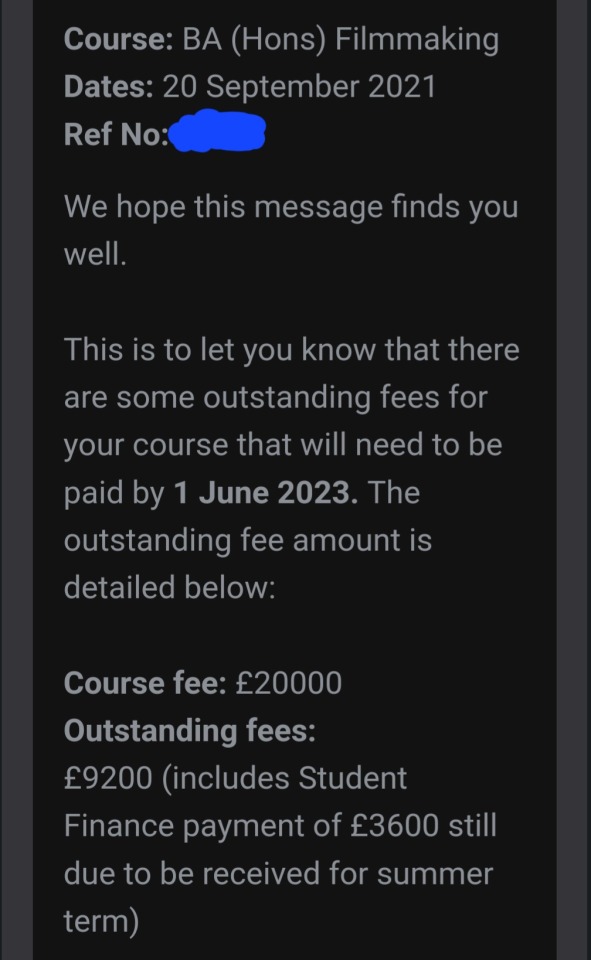
ok this is the first time ive ever had to do this but I really need the help right now. i know its going to be hard to get the full amount in the time that I have but any help would benefit me so greatly. i am putting the explanation under the cut as it is very long but TLDR:
I got into the film school of my dreams on a scholarship, but student finance will not pay for the full course fee because my university is independent, (£20k, SF can only pay £14.4k) so I have to pay the remaining fee (£5.6k) by June 1st. I cannot graduate if I don't pay this fee and I am under 2 months away from graduating. all evidence and explanation is under the cut.
gfm is here if the link above doesn't work
thank you to anyone in advance.
I have been studying filmmaking for 2 years at university and I am 2 months away from graduating. I got into this university through a scholarship that reduced the standard course fee in half. Usually, Student Finance/the government will pay for these course fees, but because my university is private, they are unable to pay the fee in full. My course costs £20k and Student Finance will pay £14,400 of this. This means I have to pay £5,600.
Here is the evidence and proof that I did get into my university on a scholarship and what my university offers in terms of fees:

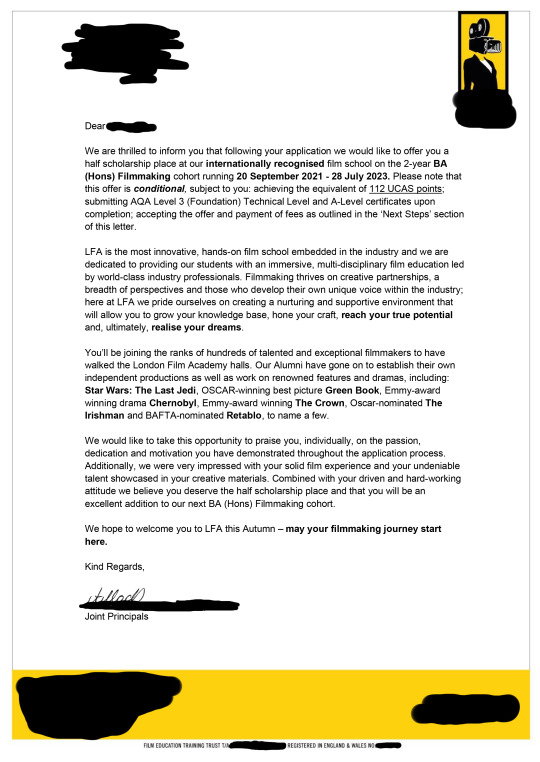
I have been looking for financial support for 2 years (before I even started attending but had a confirmed place) and it has not been enough. I have contacted my local authority for years about the grant I am entitled to as a foster care leaver and the most I could receive was £2,000 that ended up going to paying my gas and electric bills.
I have also gone to many charities to ask them for support and many of the responses I got were "go to your local authority". I did find one charity that was willing to help me but the sponsors of the charity decided that I would receive a laptop and they would pay for the travel costs to my university for a year instead. I am eternally grateful for that but now I have nowhere else to go for this.
I would really appreciate any help I am already having a extremely hard time dealing my current eviction and I am on the verge if being homeless I would just like to get something off my back and I would rather graduate and get this over with. I am still actively working to find places that are willing to help me but in the time that I have now I would appreciate it if I could get something in the meantime.
#mine#ive been trying to get help for years and I either wasn't eligible to get any money or it wasn't enough this is literally my last#resort. i didnt want to do this but I have no where else to go. i only have a week#i know its gonna be hard to get the full 5k in a week but anything I get from this will help me so much.#i have been talking to my school for MONTHS and they said I have to pay it in the month of June and this is the date they have#given me. i have tried
3K notes
·
View notes
Text
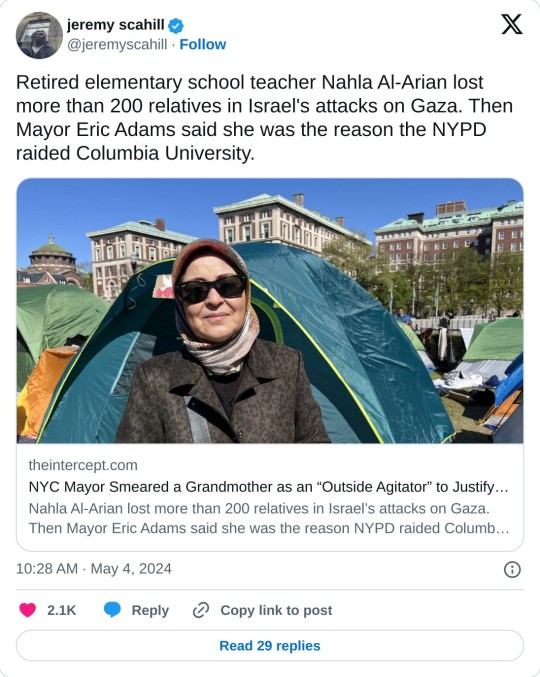
NAHLA AL-ARIAN HAS been living a nightmare for the past seven months, watching from afar as Israel carries out its scorched-earth war against her ancestral homeland in the Gaza Strip. Like many Palestinian Americans, the 63-year-old retired fourth-grade teacher from Tampa Bay, Florida, has endured seven months of a steady trickle of WhatsApp messages about the deaths of her relatives. “You see, my father’s family is originally from Gaza, so they are a big family. And they are not only in Gaza City, but also in Deir al Balah and Khan Younis, other parts,” Al-Arian told me. Recently, the trickle of horrors became a flood: “It started with like 27, and then we lost count until I received this message from my relative who said at least 200 had died.” The catastrophe was the backdrop for Al-Arian’s visit last week to Columbia University in New York City. Al-Arian has five children, four of whom are journalists or filmmakers. On April 25, two of her daughters, Laila and Lama, both award-winning TV journalists, visited the encampment established by Columbia students to oppose the war in Gaza. Laila, an executive producer at Al Jazeera English with Emmys and a George Polk Award to her name, is a graduate of Columbia’s journalism school. Lama was the recipient of the prestigious 2021 Alfred I. duPont–Columbia Award for her reporting for Vice News on the 2020 explosion at the port of Beirut. The two sisters traveled to Columbia as journalists to see the campus, and Nahla joined them. “Of course, I tagged along. You know, why would I sit at the hotel by myself? And I wanted to really see those kids. I felt so down,” she said. “I was crying every day for Gaza, for the children being killed, for the women, the destruction of my father’s city, so I wanted to feel better, you know, to see those kids. I heard a lot about them, how smart they are, how organized, you know? So I said, let’s go along with you. So I went.” Nahla Al-Arian was on the campus for less than an hour. She sat and listened to part of a teach-in, and shared some hummus with her daughters and some students. Then she left, feeling a glimmer of hope that people — at least these students — actually cared about the suffering and deaths being inflicted on her family in Gaza. “I didn’t teach them anything. They are the ones who taught me. They are the ones who gave me hope,” she recalled. “I felt much better when I went there because I felt those kids are really very well informed, very well educated. They are the conscience of America. They care about the Palestinian people who they never saw or got to meet.” Her husband posted a picture of Nahla, sitting on the lawn at the tent city erected by the student protesters, on his Twitter feed. “My wife Nahla in solidarity with the brave and very determined Columbia University students,” he wrote. Nahla left New York, inspired by her visit to Columbia, and returned to Virginia to spend time with her grandchildren. A few days later, that one tweet by her husband would thrust Nahla Al-Arian into the center of a spurious narrative promoted by the mayor of New York City and major media outlets. She became the exemplar of the dangerous “outside agitator” who was training the students at Columbia. It was Nahla’s presence, according to Mayor Eric Adams, that was the “tipping point” in his decision to authorize the military-style raids on the campus.
On February 20, 2003, Nahla’s husband, Sami Al-Arian, a professor at the University of South Florida, was arrested and indicted on 53 counts of supporting the armed resistance group Palestinian Islamic Jihad. The PIJ had been designated by the U.S. government as a terrorist organization, and the charges against Al-Arian could have put him in prison for multiple life sentences, plus 225 years. It was a centerpiece case of the George W. Bush administration’s domestic “war on terror.” When John Ashcroft, Bush’s notorious attorney general, announced the indictment, he described the Florida-based scholar as “the North American leader of the Palestinian Islamic Jihad, Sami Al-Arian.” Among the charges against him was conspiracy to kill or maim persons abroad, specifically in Israel, yet the prosecutors openly admitted Al-Arian had no connection to any violence. He was a well-known and deeply respected figure in the Tampa community, where he and Nahla raised their family. He was also, like many fellow Palestinians, a tenacious critic of U.S. support for Israel and of the burgeoning “global war on terror.” His arrest came just days before the U.S. invaded Iraq, a war Al-Arian was publicly opposed to. The Al-Arian case was, at its core, a political attack waged by Bush’s Justice Department as part of a wider assault on the rights of Muslims in the U.S. The government launched a campaign, echoed in media outlets, to portray Al-Arian as a terror leader at a time when the Bush administration was ratcheting up its so-called global war on terror abroad, and when Muslims in the U.S. were being subjected to harassment, surveillance, and abuse. The legal case against Al-Arian was flimsy, and prosecutors largely sought to portray his protected First Amendment speech and charitable activities as terrorism. The trial against Al-Arian, a legal permanent resident in the U.S., did not go well for federal prosecutors. In December 2005, following a six-month trial, a jury acquitted him on eight of the most serious counts and deadlocked 10-2 in favor of acquittal on the other nine. The judge made clear he was not pleased with this outcome, and the prosecutors were intent on relitigating the case. Al-Arian had spent two years in jail already without any conviction and was staring down the prospect of years more. In the face of this reality and the toll the trial against him had taken on his family, Al-Arian agreed to take a plea deal. In 2006, he pleaded guilty to one count of providing nonviolent support to people the government alleged were affiliated with the PIJ. As part of the deal, Al-Arian would serve a short sentence and, with his residency revoked, get an expedited deportation. At no point during the government’s trial against Al-Arian did the prosecution provide evidence he was connected to any acts of violence. For the next eight years following his release from prison in 2008, Al-Arian was kept under house arrest and effectively subjected to prosecutorial harassment as the government sought to place him in what his lawyers characterized as a judicial trap by compelling him to testify in a separate case. His defense lawyers alleged the federal prosecutor in the case, who had a penchant for pursuing high-profile, political cases, held an anti-Palestinian bias. Amnesty International raised concerns that Al-Arian had been abused in prison and he faced the prospect of yet another lengthy, costly court battle. The saga would stretch on for several more years before prosecutors ended the case and Al-Arian was deported from the United States.
“This case remains one of the most troubling chapters in this nation’s crackdown after 9-11,” Al-Arian’s lawyer, Jonathan Turley, wrote in 2014 when the case was officially dropped. “Despite the jury verdict and the agreement reached to allow Dr. Al-Arian to leave the country, the Justice Department continued to fight for his incarceration and for a trial in this case. It will remain one of the most disturbing cases of my career in terms of the actions taken by our government.” That federal prosecutors approved Al-Arian’s plea deal gave a clear indication that the U.S. government knew Al-Arian was not an actual terrorist, terrorist facilitator, or any kind of threat; the Bush administration, after all, was not in the habit of letting suspected terrorists walk. Al-Arian and his family have always maintained his innocence and say that he was being targeted for his political beliefs and activism on behalf of Palestinians. He resisted the deal, Nahla Al-Arian said. “He didn’t even want to accept it. He wanted to move on with another trial,” Nahla said. “But because of our pressure on him, let’s just get done with it [because] in the end, we’re going leave anyway. So that’s why.” Sami and Nahla Al-Arian now live in Turkey. Sami is not allowed to visit his children and grandchildren stateside, but Nahla visits often.
#yemen#jerusalem#tel aviv#current events#palestine#free palestine#gaza#free gaza#news on gaza#palestine news#news update#war news#war on gaza#columbia university#students for justice in palestine#gaza solidarity encampment#police brutality#islamophobia#war on terror#gaza genocide#genocide
464 notes
·
View notes
Text
A Boy Can Dream
Filling a prompt from @doggernaut: Bitty and Jack in their first summer dating, still secret, and Bitty seeing pictures of Jack escorting Alicia on a red carpet at some event she has and wondering if they’ll ever be able to be public like that. (And then maybe a flash forward where Jack is escorting Bitty at an event where he’s receiving an award?)
Bitty knew all about Jack’s trip to California. He knew that Jack didn’t want to go, except that he sort of secretly did, because he was bored alone in Providence.
He knew that it was a favor to Jack’s mother, who was Alicia Montgomery, a fact that Bitty still couldn’t quite wrap his head around.
Maybe Bitty was less comfortable with Jack's famous mother than he was with Jack's famous father because he’d met Bob a couple of times already before Jack’s graduation, or because Bob was so enmeshed in the world of hockey, Bob seemed … logical … for Jack to have as a parent. He fit, difficult relationship with Jack and all. When it came to trying to live up to a father’s athletic legacy, Bitty could relate. Bitty could relate hard enough that he noped right out of there at age seven.
He also knew that Jack loved his mother, loved Alicia Zimmermann, who wore faded jeans and oversized sweaters in the winter, and T-shirts and khaki shorts with sneakers in the summer. Who pulled her blond hair into a neat ponytail and didn’t wear much obvious makeup. Who was a terrible gardener, but loved it anyway, and who was a far better poker player than her husband or son.
Not that Bitty knew all that about Alicia from his own experience; he’d only ever met her at Jack’s graduation, when he was just Jack’s former teammate come to wish the graduating seniors farewell. But he and Jack had spent hours on Skype since then, not to mention the days Jack had spent in Georgia over the Fourth of July.
He’d listened as Mama and MooMaw asked Jack about his mother — Alicia Montgomery to them — and what she was like, and he’d listened to Jack talk about his favorite memories of his childhood and the week he’d spent with his parents at their cottage in Nova Scotia in June. He’d seen the family pictures on Jack’s bedside table, on his desk, on the kitchen shelf, during Skype calls.
Over the weeks, Bitty had come to an understanding that to Jack, Alicia Montgomery was not his mother. Alicia Montgomery had a job that took her away from her family for months at a time when Jack was young, a job in an industry that held impossible beauty standards not just for women, but for men and even kids, and those standards had been used to hurt Jack when he was a child.
Not by Alicia Zimmermann, certainly, and not even by Alicia Montgomery, but by the jackals that preyed on women like Alicia Montgomery, women who tied themselves to the stake as bait to get the attention they needed to get to earn the money and gain the status they needed to succeed in an entertainment industry run by men in a patriarchal society.
Okay, maybe Bitty was a little overwrought about this. Maybe he should talk to Shitty about it to get his head screwed on right and stop spinning in circles. Maybe it was no accident Jack took both Gender and Warfare in Early 20th Century America and Women, Food, & American Culture when he was at Samwell.
But one thing Bitty knew was that Jack’s relationship with his mother — who undoubtedly loved him so much it hurt and was proud of him, and would be whether he ever set foot on an ice rink or not — was just as fraught as his relationship with his father.
So when Jack had mentioned a week or so ago on their nightly Skype call that he was accompanying his mother to a benefit dinner in Los Angeles where she would be accepting an award for supporting aspiring women filmmakers, Bitty was surprised.
“Papa can’t make it,” Jack said. “He already had a fishing trip planned with Uncle Mario. And I had a tux made last year. Might as well break it out.”
Bitty’s mind had broken a little at that. He was secretly dating (were they dating? Or just, like, making out whenever possible over video call and in person? No, he was pretty sure they were dating) a man who had a tuxedo made — not rented, not bought off the rack and altered, but made for him — without even having a specific event in mind, just knowing that there would be events at which he would have to appear in a custom tuxedo. Even if he’d rather be home in his track pants and T-shirt watching tape.
He didn’t say any of that. What he said was, “You like the Hollywood stuff?”
Jack’s image on the screen had shrugged.
“It’s whatever,” he said. “I used to hate it, but now no one pays much attention to me. I’m just the appropriately dressed non-scandalous escort. And it’ll be nice to spend some time with Maman. She’s fun to sit next to. She knows everyone and all the backstories and she can be really snarky. Quietly, of course.”
Another piece of the puzzle fitted into place: Jack could be with Alicia Montgomery, and still see her as Alicia Zimmermann, at least now. Maybe it was harder when he was little?
So, given all of that, Bitty wasn’t surprised to see a Google notification for Jack Zimmermann pop up on his phone the evening of the benefit. It stood to reason that someone covering the dinner would note who the guest of honor’s escort was.
It turned out not to be one mention. There were at least half a dozen, with photos and video. The tux … did things for Jack. Did things to Bitty. He was glad California was three hours behind Georgia and he was already alone in his room when he started getting the notes. He wanted to unwrap Jack like a present, uncover the broad shoulders that the sharply tailored jacket emphasized, work the trousers down over the magnificent —
Down boy, he admonished himself.
But the photographers and videographers had clearly been enamored of Alicia and Jack, her so blond with a deep blue dress that made her eyes — eyes like Jack’s — pop, Jack so pale with dark hair, mirroring the classic black and white of his evening suit. Alicia was tall and slender, Jack was tall and thick (there really was no other word for it), and those eyes and that jawline were made for the camera.
Bitty could see now why the photographers had always been after Jack’s family when he was a child. Alicia was still a beauty, but back then … and Bob had looked much like Jack did now, unfairly handsome for a hockey player.
Bitty watched a red carpet interviewer try to engage Jack, while Jack looked bemused and said he was only there to honor his mother and support her professional eneavors. Yes, he had signed with the Falconers. Yes, he was looking forward to the season. Sorry (with that long Candadian O sound that always came out when Jack wasn’t really sorry), must go.
Bitty closed his laptop; there would be no Skype call tonight, since the dinner would not end until well after midnight on the East Coast and Jack refused to keep Bitty up so late when he had to work at camp the next day. There had been a quick phone call earlier, a few stolen minutes between camp and home, when Jack told him about the hotel and how many A-list stars his mother had had meetings with.
He lay down and tried to imagine himself living that kind of life, the kind where there were red carpets and people asking about his clothes, walking arm in arm or even hand in hand with Jack. Jack would probably have a fair few red carpets of his own during his career, not just the ones before the first games of the season — players did those on their own — but he’d surely win awards.
If Bitty was accompanying Jack, what would he wear? Classic black, like Jack? (Would Bitty ever be able to talk Jack into anything else in formalwear?) Or a subtle contrast, maybe a navy blue tux, or deep burgundy? He would stand at Jack’s elbow while interviewers talked to Jack, and look up adoringly at his … boyfriend? Husband? Who knew? A boy could dream. But the adoring look wouldn’t be hard to maintain; he could just look at Jack the way he always wanted to, without having to try not to be obvious.
When the interviews were over, Jack would take his hand (yes, definitely hand in hand. Jack’s huge hands enveloped Bitty’s, made him feel loved and protected) and sweep him off down the carpet into whatever venue they were about to enter. Jack would stay at his side, and tell him who the people he didn’t know were, and give him the tea about who cheated with whose girlfriend and …
What was he even thinking about?
None of that was going to happen. Jack was closeted, and for very good reason. If this thing — whatever it was — with Jack lasted, beyond Jack’s first season, beyond the summer, even — Bitty could never look like any more than Jack’s friend from his college team. A good friend, sure. But no more than that.
Because Jack loved hockey. Bitty hadn’t needed the talks of the past few weeks to tell him that. He’d known that hockey came first in Jack’s heart before he ever thought he might also have a place there — before he ever thought he’d want a spot in a place he once imagined was as cold as the ice.
No NHL player had ever come out as anything but straight.
There was no way Bitty would ever make him choose between hockey and their relationship, whatever it was. There was no way Bitty would win.
He sighed. Still, a boy could dream.
*
Bitty held out his phone and opened the camera app to check his teeth one more time.
“You’re fine,” Jack said, squeezing Bitty’s other hand.
Bitty turned to Jack and said, “But am I ‘fine’ or am I fine?”
“You know I think you’re fine,” Jack said, trying to imitate Bitty’s accent and emphasis.
Bitty giggled and leaned over to kiss Jack briefly.
“Mmm,” Jack said. “Definitely fine. But we’re almost there.”
Bitty leaned back against the limousine’s seat and took a deep breath.
“You seriously think the blue is okay?” Bitty asked, brushing his hand down the tuxedo jacket. “And the brocade? I shouldn’t have gone with something simple and classic, like yours?”
“I think you look wonderful,” Jack said.
“Not an answer,” Bitty said, as the car started to slow.
“I think it’s more than okay,” Jack said. “I think it’s perfect. You got nominated for an Emmy. You know you’re going to win.”
“A daytime Emmy, Jack,” Bitty said.
“Still an Emmy,” Jack said. “Ready?”
At Bitty’s nod, Jack opened the door and unfolded himself from the car, extending his hand to help Bitty out.
“Mr. Bittle! Mr. Bittle!”
The interviewers were lined up and waiting. Jack took Bitty’s hand and led him over to face their questions.
76 notes
·
View notes
Text
OK, I was going to reblog this excellent post by @luckshiptoshore so go read it, because yes. Yes!! YES!!! But then when I got started my post got super long and I felt bad tacking it onto her post and decided to make my own in response to these tags:
#i am actually a bit obsessed by the whole hunting as queerness metaphor#it’s so clearly something everyone involved in the show is thinking about#supernatural
Gurl, me too! Like go back to the start! By the time Supernatural began, the backlash against the Joseph Campbell Monomyth-style mode of storytelling had already begun in the hallowed halls of USC film school, and yo: I was there at the time of Kripke's graduation, and my best friends from college are full scale big giant time filmmakers now, whose names I will not share on main because it's uncool, and I don't want that attention, but... yeah. I am referencing FIRST HAND SOURCES on this.
But, for a real source? The Oxford English Dictionary places the first use of the term "Queer Theory" in 1990, with Queer Studies as an option in the academy by 1992. I know the kids think it's a new-fangled thing, but Kripke graduated USC in 1996 (I graduated in 1995) and it was ALL THE RAGE by then. My friends read queer theory in their Critical Studies courses in the Film School, I read it in the College of Humanities getting my degree in Literature. By that time, you could not get through that school with any degree in any non-STEM subject without knowing about ye olde postmodern lenses, queer and feminist theory, and without knowing how to employ those lenses.
Queer refers to sexuality, yes, but the word's earliest use (again, according to the OED) is in the 1500's, meaning: strange, odd, peculiar, eccentric. Also: of questionable character; suspicious, dubious.
So, ok, in 2005, Enter Supernatural, episode 1:
Presented? Two brothers. One actively seeking credit in the straight world that is not available to him in the bosom of his family: Stanford, law school, hot co-ed girlfriend, the other bound to his fractured, wounded family by duty, yes, but also by love, living on the fringe, alone, fighting monsters, and chasing after his father's approval, and who has long since given up any dream of being 'normal'. Episode 1 presents Sam's call to adventure, which he refuses when it's just familial duty, honor and love calling him, but accepts when the show takes a very straightforward and very telling path by classically fridging his woman. Ok, now he's on board. Like John, whose motivation is another dead woman, his motivation is revenge. So far so straight!
Dean though: he's different. He is already on the adventure and he was not 'called' or given the option of accepting or refusing because he had no agency when his feet were set upon this road. He does not fit the straight world at all, because he is cobbled together out of love, duty, deep guilt, striving, desperation and fear. This is who he is now, in some elemental, incontrovertible way. It was not a choice for him, he was born to it. His mother is dead, and we later learn, she made the choices that brought them all to this fate. Dean remembers her idyllically, but he is not motivated by revenge, more than any other thing, he wants to be worthy. He wants his father's approval, his brother's love.
Enter Supernatural's main theme: fucked up relationships between men enmeshed in patriarchy, which will eventually expand to include fucking GOD HIMSELF.
And like, there are SO MANY CLEAR STEPS ALONG THE ROAD in season one, and I am not even talking about sexuality and gender here, but there is SO MUCH TO SAY about it in season 1. But I am not talking about that -- I am talking at a structural, narrative level, the whole thing is just fucking all the way queered, yo.
The big climax?
At the end of the season, Dean says: "I just want my family back together. You, me, Dad... it's all I have." He is Sam's mother, John's partner! His vulnerability and emotion is feminized and contrasted with Sam and John's more overtly driven by their more masculine/straight heroic revenge quest. John: "Sam and I can get pretty obsessed, but you always take care of this family." Only that's not John talking, it's Azazel, and Dean knows it is because his father would never forgive how soft he is, how he will always choose love and family over revenge. Then, in the end, the show makes a huge point of telegraphing that Sam is finally aligning with Dean by refusing to shoot Azazel because he's possessing John, and Sam just can't do that to Dean.
Sam and Dean are thus bound together and cemented into a marginalised path, living on the road, haunting liminal spaces and cheap motels, confronting the monstrous everyday. Sam is presented as the brains of the operation, he does research, logics his way through things (masculine) while Dean is the heart who acts impulsively and on instinct and intuition (feminine).
It later transpires that Sam has a piece of the monster inside himself, and Dean has to learn to love the monstrous, he has no choice, because Sam is his brother and then Cas... and, and, and!
Like... I could go on and on, citing ENDLESS EXAMPLES. This could be a literal book. Maybe one you need to read with a magnifying glass like my condensed edition of the OED. LIke, the queerness of Supernatural is DIZZYING and MYRIAD.
But basically? FROM THE START, hunting is a queered version of family, and within that, Dean is a queered version of a Campbellian hero. Hunting is a metaphor for otherness and liminality, and that's even before you say a WORD about sex. It starts in deviation from the norms of family, masculinity and expands from there on so many levels both in story and on a meta level. The story is flesh on queer fucking bones.
I'm so sorry, but anyone who thinks queerness was not BAKED INTO Supernatural and more specifically into Dean from DAY 1 has clearly never seen Dean's insane lip gloss in season 1, and vastly underestimates the cultural awareness of people who write shit in Hollywood, and also the other people who put pink lip gloss on pretty boys in Hollywood. Nothing that gets on your screen wasn't a fucking choice made and approved by a LONG LIST of people who know what they are about.
#supernatural#dean winchester#sam winchester#the queerness is baked in from the word go#like...OBVIOUSLY#and transparently
167 notes
·
View notes
Note
Hey, Mike! Did moving to Los Angeles at the start of your career turn out to be all that you thought it would be? It’s a big step that a lot of people take, and I’ve never really heard you talk about those early years before. Did you ever contemplate quitting? And if so, I’m glad you stuck to it - we love your work!
Oh, I contemplated quitting many, many times.
I moved to Los Angeles in January, 2003. I had just graduated the previous summer from Towson University, and a group of five of us moved out together. Some wanted to be filmmakers, some wanted to be actors. We shared a 3-bedroom apartment in Glendale. The adjacent apartment was occupied by four other Towson alums. Between the two apartments, we called it "Little Towson." I didn't own a car at the start. I had no health insurance. I'd saved a few thousand dollars to get me through the first six months, but none of us had jobs at the beginning. I remember applying (and being rejected) for a job at Walmart. I combed Craigslist looking for non-union editorial gigs.
I had told myself I'd give it five years, and if I hadn't gotten any traction, I'd move back to Maryland.
People started dropping out pretty quickly. One of my roommates (and one of my best friends) had moved out here to be an actor, and only lasted a few months before he decided to go back. It's overwhelming and terrifying to take a leap into a city as expensive as LA, and you're surrounded by people who all want the same career that you want. But it feels like there is a thousand foot wall circling the industry, and it seems impossible to scale it.
I found work doing odd editorial jobs before working as a logger, than an assistant editor, then an editor on a few reality shows. I shot and cut those local car commercials you see on late night cable. And I frequently ran out of money and overdrafted my account. As more and more of our original group gave up and moved back East, I started to feel more and more crazy. A lot of my friends from school were getting married, buying houses, having kids. I felt pretty delusional as my 5-year deadline came and went, and I still hadn't found any way over or through that wall. When we started to talk about making Absentia in 2010, I had been in LA for more than 7 years. I was working two jobs as an editor. I found out I was going to be a father. It felt very much like whatever I'd wanted to happen by moving to LA was not going to happen. Absentia was kind of last-ditch effort. Ultimately, the five year plan I'd allowed myself when I moved to LA turned into a 9-year plan. I started shooting Oculus - my first "real" movie - in the fall of 2012, just shy of my 10th anniversary in Los Angeles. That movie wouldn't come out for a while after that, so by the time I actually had a career as a filmmaker, well over a decade had passed struggling in LA.
For most of that time, my refusal to move back to Maryland looked (and felt) like a delusion. Only afterward did it start to look like "tenacity." And it never felt like "persistence" or "determination"... it felt insane. It felt like constant, daily frustration and rejection. And when I couldn't pay the bills, or couldn't land a job, it felt downright embarrassing.
For what it's worth, the only difference I've seen between people who "make it" out here and don't are that the ones who made it all stayed long past their expiration dates. I've seen wildly talented people pack it up and head home. Talent helps a lot once the door is open, but really the only thing that opens the door is persistence. To the point of feeling insane.
309 notes
·
View notes
Text
The Bear - Sleight Of Hand Movie Posters
The Bear and films go hand in hand. @chefkids has mentioned movies that influenced the Bear, @thoughtfulchaos773 talks about filmmaking please see the link (thank you for your help! :)) and we discussed the horror themes of S3. (Check out thoughtful for that too.)
We know anything that can be read or seen in a scene is important.
So, let's talk about the movie posters from S1,S2 & S3. Sorry gang, it's a bit long lol.
Each season has a set posters that depict the plot of the season and where the next might go.
S1 - All the Right Moves, Marked for Death, Ghostbusters, Groundhog Day, Speed, Jumping Jack Flash, and Only The Lonely
All the Right Moves- a talented footballer who longs for something more outside his hometown and the family job. (Carmy)
Marked for Death- Main character, DEA agent, his partner is killed in an undercover drug deal. Main character returns home to Chicago to find it taken by drug dealer. (Carmy and Mikey)
Ghostbusters- I don't think I need to explain this one. Lol S3 and haunting and how they have to work together
Speed - the 2 main characters need to stop a bad guy before a bomb goes off. The characters become love interests. (Every Second Counts, Sydney and Carmy.)
Jumping Jack Flash - Whoppi Goldberg is a computer genius who needs to help a secret agent. The characters become love interests. AND HE STANDS HER UP AT A RESTAURANT. I shit you not. (Sydney and Carmy) Also, every second counts theme and calling someone cousin is in this movie.
Groundhog Day -another I don't need to explain BUT it's interesting this theme is more striking in S3. AND how Bill Murray's character falls in love
Only the Lonely - now this one I'll link here. This one needs it's own post. But essentially it's a guy who cares for his mom but he meets a girl, likes her and starts dating her despite what his family and friends say.
BUT I THOUGHT THE BEAR WASN'T A ROMANCE. THEN WHAT THE HECK IS THIS DOING IN S1 SAYING THE PLOT OF S2 and part of S3 and probably S4?!
https://en.m.wikipedia.org/wiki/Only_the_Lonely_(film)
S2 - Rounders, Alien, White Squall
Rounders - Main character MIKE loses 30k to mobster KGB. And how he pays it back.
Mikey had the original loan and don't forget KBL. Carmy is now left with it.
Alien - this is S3!!!! Alien life force takes over one of the crew and they get tormented (fucked) by it. (Carmy gets taken over and Sydney is left to figure out her shit :()
White Squall - S2 and S3 - how they need to overcome a storm together and learn together
S3 - 25th Hour and Say Anything
25th Hour - guy spends his last day before going to jail trying to make things right. (Possible S4? Main character has a love interest!)
Say Anything - another 80's love movie. "The film follows the romance between Lloyd Dobler (John Cusack), an average student, and Diane Court (Ione Skye), the class valedictorian, immediately after their graduation from high school." <Wikipedia
What I will say about this movie is that the girls DAD does not approve of Lloyd. And Lloyd makes GRAND GESTURES.
Now, again, a romance when we're told it's not...Pppffftttttt! It's been a freakin romantic plot since the start.
Let me know what you think.
#the bear#sydcarmy#carmy berzatto#sydney adamu#sydney x carmy#carmy x sydney#mikey berzatto#the bear season 3
72 notes
·
View notes
Text
FAQ
-Do you have other platforms where you post your stuff? Yes I have! Instagram, Tiktok, Twitter and Patreon
-What software are you using to create them? Blender , but i started making them first in Source Filmmaker
-Can I use your renders as pfp? Sure! I do not have a problem with that
-What do you think about reposting your work? DO NOT repost my renders especially on Pinterest. If you like something, you can “reblog” here, “retweet” on Twitter and “repost” on Tiktok. There is no need to download my art and post it on your account
-Can I create art based of your renders? I used to be in favor of supporting artists and I was open for you being inspired by my stuff, but after MANY unpleasant situations where people copied my stuff and "forgot" to give credits I am done. So do not trace and copy my renders.
-Do you do commissions? Sorry but no. I don’t want to treat it as a job, but as a hobby and something that allows me to relax and learn new things.
-Do you sell your work somewhere? I don’t sell my renders anywhere, so if you see them somewhere as posters, t-shirts, stickers etc., please know that they are stolen and used without my knowledge and consent.
-What if I want to support you? I have Ko-fi and Patreon
-How long does it take you to make renders? Many hours. I am self-taught, I did not graduate from any special school in this field, so I often devote a lot of time to learning, so please respect that. But to answer your question, it depends on the project - sometimes 4 hours, sometimes a week.
It’s still fanart after all so sometimes I make mistakes.
52 notes
·
View notes